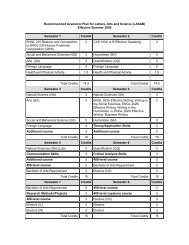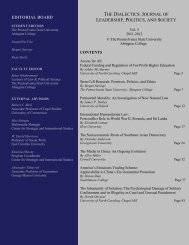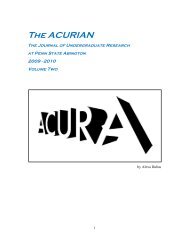Vol. III - Penn State Abington
Vol. III - Penn State Abington
Vol. III - Penn State Abington
Create successful ePaper yourself
Turn your PDF publications into a flip-book with our unique Google optimized e-Paper software.
e more important than the damage likely to be done to the satisfaction and identity of the person<br />
targeted” (Nelson, 2005:68).<br />
Now that I have laid forth the theoretical framework that supports how a robust concept<br />
of freedom of expression affects self and society, I will explain why the First Amendment of the<br />
United <strong>State</strong>s Constitution should be considered as the universal standard for self-expression.<br />
First amendment jurisprudence has been broken down into three categories for protection<br />
purposes. One category is obscenity. Obscenity receives no protection, unless it holds political,<br />
social, or artist value (Bobbit, 2007:19).<br />
The next category of expression is commercial expression. Commercial expression is<br />
“expression related to the economic interests of the speaker and its audience, generally in the<br />
form of a commercial advertisement for the sale of goods and services” (U.S. Healthcare v. Blue<br />
Cross, 1990). The First Amendment does allow some regulation on commercial speech. These<br />
regulations would include false advertising. However, regulations on commercial expression are<br />
somewhat relaxed (Pittsburgh Press v. Human Rel., 1973).<br />
The final category of expression is political expression. Political expression is minimally<br />
regulated, and whatever regulation exists must meet “strict scrutiny,” the highest level of judicial<br />
review. The Supreme Court has created judicial tests to determine when political speech can be<br />
regulated. One such test holds that political speech can be regulated when “directed at inciting or<br />
producing imminent lawless action” and when the speech is “likely to incite or produce such<br />
action” (Brandenburg v. Ohio, 1969).<br />
The three categories of expression above allow for robust debate and only include<br />
minimal regulation. Accordingly, the American public can strive and develop in accordance with<br />
the theories detailed previously. For this reason, the American free expression jurisprudence can<br />
be considered the standard and one that the European Union should follow as it develops its own<br />
free expression jurisprudence. So far, the EU developments in this area have been weak.<br />
First, one can look to the proposed constitution of the European Union. The constitution<br />
includes the right to free expression, found in Article II-71: “everyone has the right to freedom of<br />
expression. This right shall include freedom to hold opinions and to receive and impart<br />
information and ideas without interference by public authority and regardless of frontiers” (EU<br />
Constitution, 2004). This provision appears to allow for a robust expression regime and would<br />
fall under the theories mentioned above, but other articles of the proposed constitution may<br />
potentially be in conflict with the provision. For example, Article II-61 states, “human dignity is<br />
inviolable. It must be respected and protected” (EU Constitution, 2004). The notion may<br />
potentially create a conflict with Article II-71, for, at times, expression may offend human<br />
dignity. For example, if two individuals get into an argument and one expresses to the other<br />
some harsh sentiments, the offended party may claim that the harsh sentiments have violated his<br />
dignity and may attempt to take action against the expresser for violating his human dignity in<br />
accordance with Article II-61.<br />
A similar situation could arise under articles II-63, which states, “everyone has the right<br />
to respect for his or her physical and mental integrity” (EU Constitution, 2004). The individual<br />
could simply claim that the expresser of the harsh sentiments had disrespected his mental<br />
integrity and because of this, again, try to take action against him.<br />
There appears to be one more conflict, found in Article II-82 “The Union shall respect<br />
cultural, religious and linguistic diversity” (EU Constitution, 2004). As an example of a conflict<br />
that could arise between Article II-71 and this article, we could examine a hypothetical<br />
investigative exposé of a particular religion. For example, if the European Union were to sponsor<br />
THE DIALECTICS ▲ 2009<br />
www.abington.psu.edu/dialectics<br />
53







